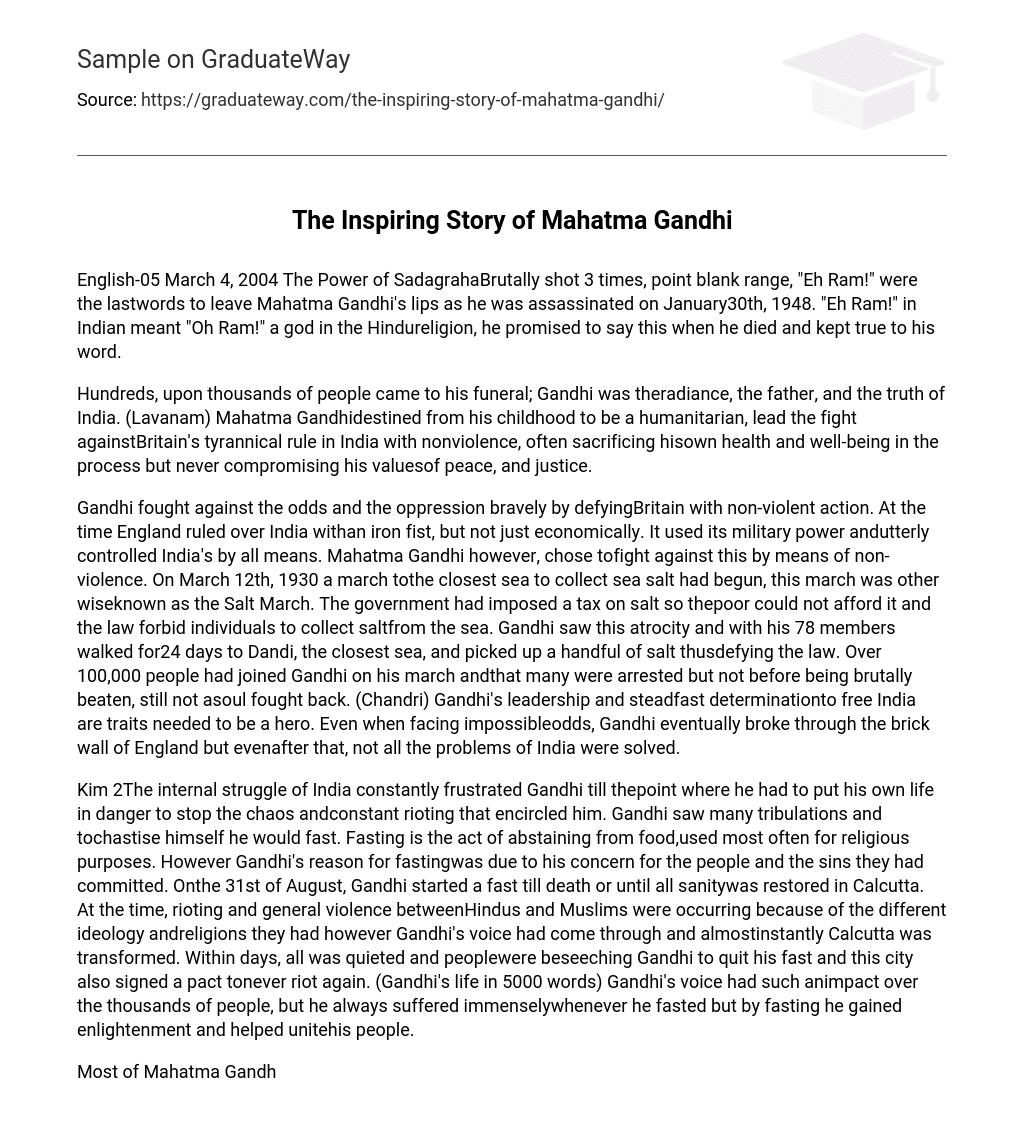The Power of SadagrahaBrutally shot 3 times, point blank range, “Eh Ram!” were the lastwords to leave Mahatma Gandhi’s lips as he was assassinated on January30th, 1948. “Eh Ram!” in Indian meant “Oh Ram!” a god in the Hindureligion, he promised to say this when he died and kept true to his word.
Hundreds, upon thousands of people came to his funeral; Gandhi was theradiance, the father, and the truth of India. (Lavanam) Mahatma Gandhidestined from his childhood to be a humanitarian, lead the fight againstBritain’s tyrannical rule in India with nonviolence, often sacrificing hisown health and well-being in the process but never compromising his valuesof peace, and justice.
Gandhi fought against the odds and the oppression bravely by defyingBritain with non-violent action. At the time England ruled over India withan iron fist, but not just economically. It used its military power andutterly controlled India’s by all means. Mahatma Gandhi however, chose tofight against this by means of non-violence. On March 12th, 1930 a march tothe closest sea to collect sea salt had begun, this march was other wiseknown as the Salt March.
The government had imposed a tax on salt so thepoor could not afford it and the law forbid individuals to collect saltfrom the sea. Gandhi saw this atrocity and with his 78 members walked for24 days to Dandi, the closest sea, and picked up a handful of salt thusdefying the law. Over 100,000 people had joined Gandhi on his march andthat many were arrested but not before being brutally beaten, still not asoul fought back. (Chandri) Gandhi’s leadership and steadfast determinationto free India are traits needed to be a hero. Even when facing impossibleodds, Gandhi eventually broke through the brick wall of England but evenafter that, not all the problems of India were solved.
The internal struggle of India constantly frustrated Gandhi till thepoint where he had to put his own life in danger to stop the chaos andconstant rioting that encircled him. Gandhi saw many tribulations and tochastise himself he would fast. Fasting is the act of abstaining from food,used most often for religious purposes. However Gandhi’s reason for fastingwas due to his concern for the people and the sins they had committed.
Onthe 31st of August, Gandhi started a fast till death or until all sanitywas restored in Calcutta. At the time, rioting and general violence betweenHindus and Muslims were occurring because of the different ideology andreligions they had however Gandhi’s voice had come through and almostinstantly Calcutta was transformed. Within days, all was quieted and peoplewere beseeching Gandhi to quit his fast and this city also signed a pact tonever riot again. (Gandhi’s life in 5000 words) Gandhi’s voice had such animpact over the thousands of people, but he always suffered immenselywhenever he fasted but by fasting he gained enlightenment and helped unitehis people.
Most of Mahatma Gandhi’s life was in the service to others beforehimself. Gandhi had always been a non-materialistic man, and you could tellby the way he dressed, which was usually in a white, homespun, loin cloth. But he also “gave” away his life little by little, teaching others byspeech, forging bonds between fighting workers and companies, uniting thepeople of his country and his time in jail for doing the right. Gandhi lostconsiderable time in jail, constantly being imprisoned for doing gooddeeds. One of his notable jailing was when he was resisting the Black Actwhich required all Indians to register and carry identification at alltimes.
After a compromise with General Smuts, the general who enforced alllaws, all Indians were to register voluntarily, nevertheless General SmutsKim 3went back on his word and Gandhi told all Indianstoburntheidentification in a bonfire and as a result was jailed. However the Generalsoon folded under Gandhi’s non-violent power and the Black Act was revoked.
Mahatma Gandhi’s true concern for his people and doing whatever it took fora just cause, even if it was his life was in danger, were truly heroictraits. Everyone has their faults however some have fewer then others, Gandhiwas one of those fortunate people who had fewer faults then others butwould never admit it himself. Gandhi lived his life accepting all types ofcultures and religions, but that may have been a cause to his death.
Gandhiloved all different religions even though he was a Hindu. His prayersincluded passages from other religions such as Christianity, Judaism, andBuddhism to name a few. One could argue that he did not stay truthful orfaithful to his real religion. Yet he accepted all people just like heaccepted all religions, he never said either was better or worse, they’reall equal in his eyes. But his open heart and ear to other religion led himto his death. (Lavanam)
Mahatma Gandhi was India’s and the world’s light in the everdarkening world of xenophobia and anguish. Gandhi fought for freedom bymeans of peace, never raising a fist and urging others never to do so. Evenafter accomplishing his goal of freeing India, he never stopped teachingothers. Gandhi inspired many from his teachings and changed lives of many.
As General Smuts who received a pair of sandals he made from Gandhi oncesaid “I have worn these sandals for many a summer since then even though Imay feel that I am not worthy to stand in the shoes of so great a man.”





